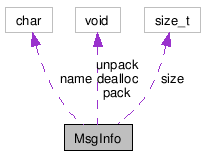

#include <register.h>

Public Member Functions | |
| MsgInfo (const char *n, CkPackFnPtr p, CkUnpackFnPtr u, CkDeallocFnPtr d, int s) | |
Data Fields | |
| CkPackFnPtr | pack |
| A message pack function converts the (possibly complex) message into a flat array of bytes. | |
| CkUnpackFnPtr | unpack |
| A message unpack function converts a flat array of bytes into a living message. | |
| CkDeallocFnPtr | dealloc |
| A message deallocation function deletes the message with the appropriate actions. | |
| size_t | size |
| This message body's allocation size. | |
| const char * | name |
| Human-readable name of message, like "CkMarshallMsg". | |
It is always stored in _msgTable.
Definition at line 142 of file register.h.
| MsgInfo::MsgInfo | ( | const char * | n, | |
| CkPackFnPtr | p, | |||
| CkUnpackFnPtr | u, | |||
| CkDeallocFnPtr | d, | |||
| int | s | |||
| ) | [inline] |
Definition at line 178 of file register.h.
A message pack function converts the (possibly complex) message into a flat array of bytes.
This method is called whenever messages are sent or duplicated, so for speed messages normally have a layout which allows this conversion to be done in-place, typically by just moving some pointers around in the message.
There was once a time when the pack function could be NULL, meaning the message can be sent without packing, but today the pack function is always set. Note: pack and unpack have nothing to do with the PUP framework.
Definition at line 157 of file register.h.
A message unpack function converts a flat array of bytes into a living message.
It's just the opposite of pack.
Definition at line 162 of file register.h.
A message deallocation function deletes the message with the appropriate actions.
Definition at line 167 of file register.h.
This message body's allocation size.
This does *not* include any dynamically allocated portion of the message, so is a lower bound on the message size.
Definition at line 173 of file register.h.
| const char* MsgInfo::name |
 1.5.5
1.5.5